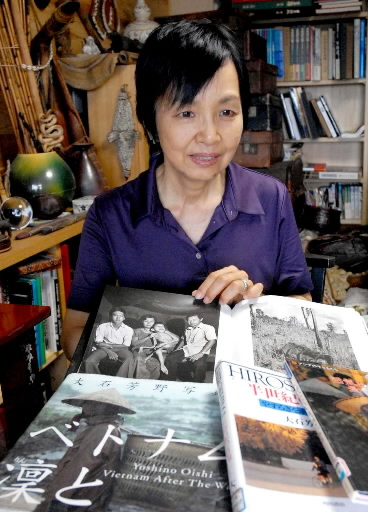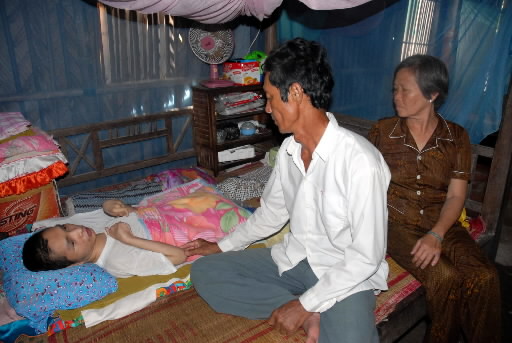Vietnam: 50 years after the use of defoliants: Recognize the absurdity of war
Jul. 25, 2012
An interview with Yoshino Oishi, photographer
In 1966 while I was studying photography at a university in Tokyo, I went to South Vietnam during the war as a member of a student exchange group.
With wan faces, the Vietnamese college students who were about to be drafted said they envied us because Japanese young people could follow their own paths in life. When I asked them if there was something I could do for Vietnam, they told me to work hard for Japan because that would, by extension, benefit them. I felt like I’d been hit over the head. I decided to convey the ravages of war through photographs and try to end war. That was the real beginning of my efforts.
I started documenting the aftermath of the Vietnam War in 1981 as a freelance photographer. There was very little information on the effects of defoliants then. Before I started reporting, I myself doubted whether there would really be harmful effects 10 years after the spraying had ended. But when I traveled around the country I was dumbfounded by the severity and scale of the damage.
Vietnam has developed, and now it’s full of Japanese tourists. Surrounded by the beautiful nature of that tropical land, they enjoy dining on delicious food and buying souvenirs at fashionable shops. I have no problem with that.
If they appreciate the charms of Vietnam they’ll want to become friends with its people. They’ll take an interest in its culture and history too. But what will they do when they become aware of the country’s dark side? They have no choice but to ponder that themselves.
I have taken photos not just of victims of the war but also of Vietnam’s rich culinary culture and its young lovers. In that wonderful country, which is our neighbor in Asia, there is still suffering all these years after the war. I would like people to recognize the absurdity of war, and if tourism provides the catalyst for that, that’s fine.
War, the atomic bombings, defoliants, the nuclear power plant accident: in all of these it was ordinary people who were hurt. In order to provide aid to those who have been harmed it is important to widen the circle of people involved. I will continue to travel to Vietnam in order to assist in this effort.
Yoshino Oishi
Born in Tokyo in 1943. Became a freelance photographer after graduating from the College of Art at Nihon University. Photographic collections include “Vietnam after the War” (winner of the 20th Domon Ken Award) and Hiroshima: Hanseiki no shozo. Yasuragi wo motomeru hibi (“Portraits of Hiroshima over Half a Century: Days Pursuing Peace of Mind”). Author of Ano hi Betonamu ni karehazai ga futta (“Defoliants Fell on Vietnam That Day”).
Upon the conclusion of this series
by Takamasa Kyoren, Staff Writer
Support for victims: Continue to raise questions
During the course of my reporting, victims of defoliants repeatedly said that no matter how many times they told others of their experiences, nothing changed. Nevertheless many people talked to me about their painful experiences and the current situation through their tears and sometimes anger.
This spring I traveled to Vietnam, the United States and South Korea to report on the issue of defoliants. In Ben Tre Province in the Mekong Delta of southern Vietnam, three of the six children of a 67-year-old veteran were born with brain damage or physical handicaps. “Nothing can make up for that,” he said, “but I need financial assistance in order for my children to survive.”
In some households with seriously disabled family members there are not enough wage earners. Thirty-seven years after the end of the war, further effects of defoliants are emerging. Vietnam’s rapid economic growth has widened the gap between rich and poor, and people are impatient with the worsening situation let alone the lack of relief measures.
The facts with which I filled my reporter’s notebook are serious, and the scope of the effects of defoliants continues to expand. I wonder how well I understood the victims’ thoughts and feelings.
As with the atomic bombing of Hiroshima, in Vietnam memories of the war are fading. During my college days I lived in Vietnam for about 10 months, but this was my first exposure to its dark side. There is still a long way to go before the wounds of the war are healed. I will continue to ask myself what I can do.
(Originally published on July 22, 2012)









